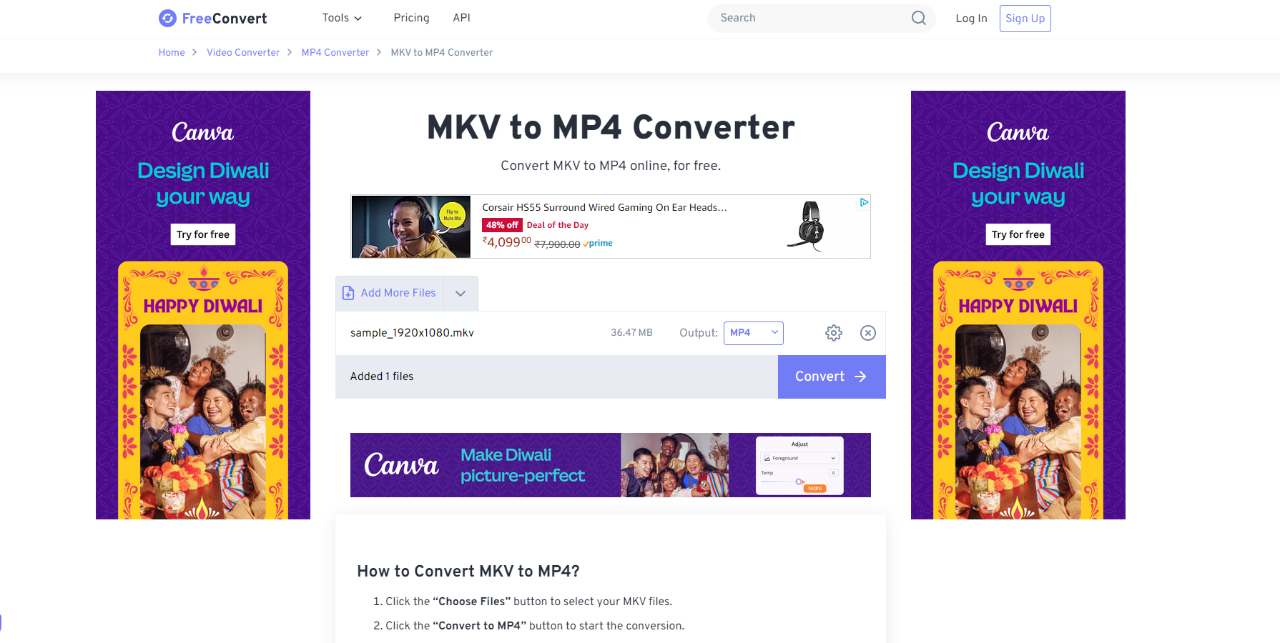Video files come in various formats, including MKV to MP4, each with its own advantages. MKV, known for superior quality, supports diverse codecs and multiple tracks. However, its drawback lies in limited support across platforms. To bridge this gap, users often turn to MKV to MP4 converter apps. These applications enable the transformation of MKV files into the more universally accepted MP4 format.
The ideal converter app not only facilitates this transition but also extends its support to other formats, enhancing versatility for users with diverse needs. In this guide, we will explore the intricacies of these formats and delve into the process of converting MKV to MP4, offering a solution for seamless compatibility across devices and platforms.
This guide will also include the steps on how to convert MKV to MP4. Moreover, if you're interested in video compression, we offer the review of the popular tools to compress a video in our tutorial of How to Compress A Video without Losing Quality?
Understanding MKV and MP4 File

MKV, also called Matroska Multimedia Container, is a format known for its high-quality video storage. This open and free format allows professionals to encode videos with various codecs, making it a preferred choice for content creators who prioritize flexibility in multimedia packaging.
It can support multiple audio and subtitle tracks within a single file, which is particularly advantageous for professionals dealing with diverse language options or intricate audio setups. However, users may need to convert MKV to MP4 in scenarios where universal compatibility of the video format is necessary. Due to their popularity, you will come across MKV to MP4 converter free of cost apps.

On the other hand, MP4, or MPEG-4 Part 14, is a widely adopted format in the professional and business realms. Its standardized structure and compatibility across a broad range of devices and platforms make it an ideal choice for content streaming, sharing, etc. Professionals benefit from the efficiency of the H.264 video codec commonly associated with MP4, delivering good compression without sacrificing quality.
In business scenarios, where seamless sharing and accessibility are paramount, MP4's widespread support ensures that content is easily viewable across various devices and platforms, contributing to effective communication and collaboration.
Ultimately, the choice between MKV and MP4 depends on the specific needs and priorities of professionals and businesses in terms of content creation, sharing, and accessibility.
Why Convert MKV to MP4?

Professionals and casual users often convert MKV to MP4 for several compelling reasons. First and foremost, MP4 boasts widespread compatibility across a broad spectrum of devices, platforms, and media players, making it a more accessible format for sharing and playback. Many professional environments and online platforms favor MP4 due to its standardized structure and efficient H.264 video codec, ensuring optimal compression without compromising quality.
Additionally, while MKV offers flexibility with various codecs and supports multiple tracks, its limited support on certain devices and players prompts users to convert to the more universally recognized MP4 format. Converting to MP4 simplifies the sharing and distribution process, ensuring seamless playback experiences for both professionals delivering presentations and casual users sharing multimedia content across diverse devices and applications.
Step-by-Step Guide to Convert MKV to MP4
FreeConvert is a free MKV to MP4 converter platform online. In fact, it offers even more formats that you can convert from and to.
Step 1: Using the link above will redirect you to the website, specifically the MKV to MP4 page where you can get started with the process.

Step 2: You can upload the video on the page. You can either upload directly from your device or use digital storage, such as Google Drive or Dropbox. You can also paste a URL of the video. Moreover, you can scroll down below to set your preferences. You will see many options such as codec, video aspect ratio, adding subtitles, and more.

Step 3: After you convert MKV to MP4 online, you can use the download option to save the video.

Bonus Tips: Optimizing MP4 Files
Compressing MP4 Files

Compressing MP4 files is a process that involves reducing the file size of a video while maintaining acceptable visual and audio quality. This compression is valuable for various reasons. Firstly, it aids in efficient storage and faster transmission, crucial for online streaming and content distribution. Besides offering the AI video editor tool to convert MKV to MP4 free, FreeConvert also offers a video compressor tool.
The process typically involves using advanced video codecs, like the widely adopted H.264 or newer standards like H.265, which achieve higher compression ratios without significant loss in quality. Compressing MP4 files is especially beneficial for optimizing storage space on devices with limited capacity and ensuring smoother streaming experiences in bandwidth-restricted environments.
Additionally, smaller file sizes contribute to quicker upload and download times, enhancing overall user accessibility and satisfaction. In summary, compressing MP4 files is a practical strategy for optimizing storage, facilitating faster data transfer, and improving the overall efficiency of video content consumption.
Adding Subtitles and Metadata

MP4's capability to seamlessly incorporate subtitles and metadata makes it a versatile choice, especially after converting from MKV. Subtitles can be added to MP4 videos post-conversion, enhancing accessibility for a global audience.
The MP4 format supports various subtitle formats, allowing users to include multiple language options or captions. Additionally, metadata, such as title, author, and copyright information, can be embedded directly into the MP4 file. This proves invaluable for professionals and content creators, as it streamlines organization and enhances the user experience.
With subtitles and metadata seamlessly integrated into MP4 files, the format becomes not only a universal and widely supported choice but also a feature-rich solution for conveying information, ensuring accessibility, and maintaining a polished and organized presentation of multimedia content.
Conclusion
In today's digital landscape, videos play a crucial role for businesses, individuals, and creators seeking to establish a robust online presence. The importance of having videos in different formats arises from the unique strengths each format brings to the table. Also, ensuring optimal video quality is paramount in captivating audiences and delivering a compelling visual experience. Whether it's enhancing resolution, refining color balance, or reducing noise, a proficient video quality enhancer is the best option.
MKV, renowned for high-quality video sharing, excels in flexibility with diverse codecs and multiple tracks. However, to enhance accessibility and expand sharing options, users often find it beneficial to convert MKV file to MP4. This guide empowers users with the knowledge of how to perform this conversion, enabling them to navigate the dynamic digital landscape with ease.
By understanding the features and advantages of both MKV and MP4 formats, users can strategically utilize each format to suit their specific needs, whether it's delivering high-quality content or ensuring broad compatibility across various platforms.






